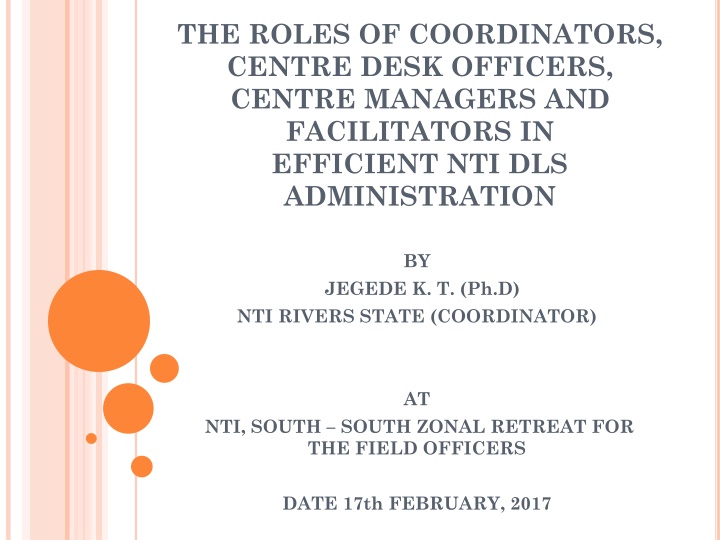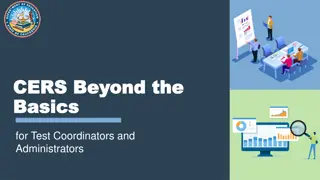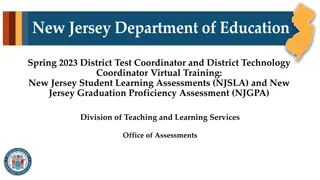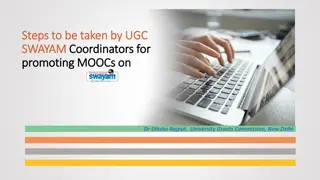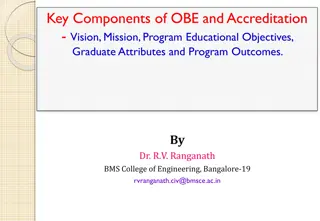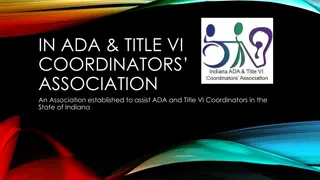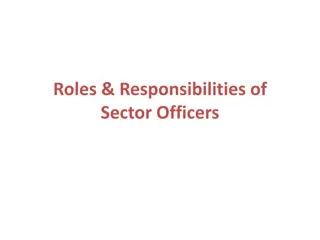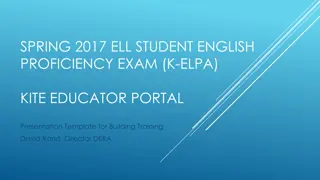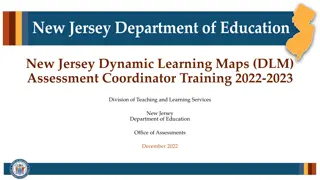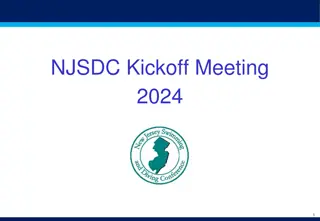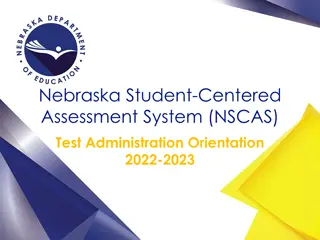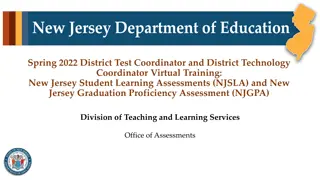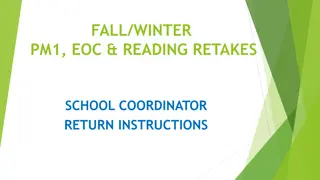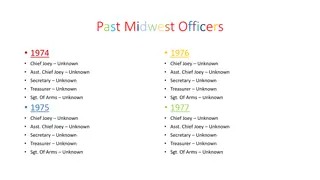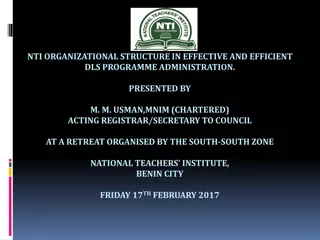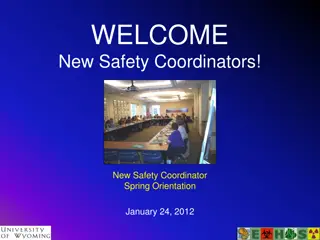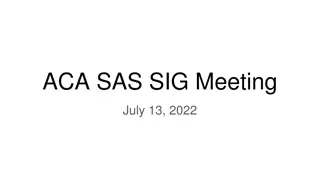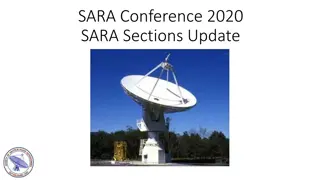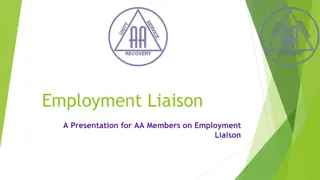Roles of Coordinators and Officers in Efficient NTI Administration
This paper explores the key roles of State Coordinators, Centre Desk Officers, Centre Managers, and Course Facilitators in the efficient administration of NTI DLS programs. It emphasizes the importance of these personnel fulfilling their duties to ensure the success of NTI programs, ultimately contributing to the achievement of the Institute's goals. The challenges faced by Study Centers are highlighted, along with recommendations for enhancing the implementation of NTI programs in Nigeria.
Download Presentation

Please find below an Image/Link to download the presentation.
The content on the website is provided AS IS for your information and personal use only. It may not be sold, licensed, or shared on other websites without obtaining consent from the author.If you encounter any issues during the download, it is possible that the publisher has removed the file from their server.
You are allowed to download the files provided on this website for personal or commercial use, subject to the condition that they are used lawfully. All files are the property of their respective owners.
The content on the website is provided AS IS for your information and personal use only. It may not be sold, licensed, or shared on other websites without obtaining consent from the author.
E N D
Presentation Transcript
THE ROLES OF COORDINATORS, CENTRE DESK OFFICERS, CENTRE MANAGERS AND FACILITATORS IN EFFICIENT NTI DLS ADMINISTRATION BY JEGEDE K. T. (Ph.D) NTI RIVERS STATE (COORDINATOR) AT NTI, SOUTH SOUTH ZONAL RETREAT FOR THE FIELD OFFICERS DATE 17th FEBRUARY, 2017
ABSTRACT This paper examine the roles of State Coordinators, Centre Desk Officers, Centre Managers and Course Facilitators in efficient NTI DLS administratio. The paper recongnizes that the State Coordinator, Centre Desk Officer, Centre Manager and Facilitators must perform their statutory roles or functions for the effective and efficient administration of NTI Programmes. This is to ensure the realization of the goals of the Institute. NTI, Kaduna was established in 1976 to provide in-Service Education for teachers through the Open and Distance Learning System (DLS). As stipulated in Decree No. 7 (now Act No7) of the Federal Military Government of Nigeria (1978), the Institute is charged with the duty of providing courses of instruction leading to the development, upgrading and certification of teachers as sepecified in relevant syllabus using Distance Education techniques . The paper identified the State Coordinator as the Manager of the Programme in the State. The Centre Desk Officer, is the administrative head of the Centre. The Centre Manager is appointed to serve as a link between field Centre and Study Centre on all academic issues. The Course Facilitators guide the students on how to make use of NTI Course materials. The paper identified the challenges of the Study Centres and makes recommendation for the effective implementation of NTI programmes. Finally, concludes that the aformention key staff of the Institute are clearly required to facilitate the successful implementation of NTI Programmes in Nigeria. Keywords: Roles, Efficient, and Administration. the paper
INTRODUCTION Every orgainization has its purpose usually expressed in the organization s mission statement (Jegede 2011). Suffice it to state that it is from such mission statement that the organization policy emerges. Such policies are authoritative judgement which establish the platform for administrative action. A policy in the context of this paper could typically be described as a delibrate plan of action directed towards meeting the organization goal. Jegede (2011), states that policies mainly guide actions towards the achievement of the desired outcome. One of the most notable collection of education policies in Nigeria is documented in Federal Republic of Nigeria (FRN) National Policy on Education NPE (2004). This document provides practical quidelines to officers of the Ministry parastatals of which NTI or the Institute is one. This includes, matters relating to Open and Distance Education as provided by the Federal Republic of Nigeria (FRN) National Poblicy on Education (2004), section 6 pages 50-51. of Education, Officers of its
INTRODUCTION The National Teachers Institute (NTI) Kaduna was established to meet the demand for trained teachers, as a result of the introduction of Universal Primary Education scheme in 1976. NTI got its charter in 1978 (Degree No. 7 of 10th April 1978) NTI as an agency was given the mandate to train and upgrade teachers without pulling them off their jobs. In the process of bringing about devolopments and to meet the increasing demands for trained teachers, NTI brought forth the NTI strategic plan: 2002- 06 along with a detailed implementation scheme in 2002. NTI further links with various international bodies such as commonwealth of learning (COL), Vancouver, Canada, to mobilize funding, expertise and support for its developmental activities. Based on the foregoing the NTI Programmes, as clearly stated in the supplement to official Gazattee (1978), number 20, volume 65, and part A, Programmes are organised under schools which are described as study centres in the state of the federation, and they are charged with the duty of organizing various programmes in the centres, this refer to courses of studies and activities that include lectures, workshops seminars, conferences and other activities leading to the implementation of the policies of NTI.
INTRODUCTION Distance Education is thought to be an effective way of educating people of all sections in society. The delivery system in distance education conventional on-Campus teaching and learning. It should be emphasied that distance education is a close substitute for the conventional on-campus teaching. Distance and open learning (ODL) system can play an important role to offer education to those who could not enrol in the conventional on-campus system of eduction. Although, the DLS education seem to be the most efficient and appropriate way of education in the developing Countries, the great concern yet that attracts the attention of distance education is the quality of the programmes administration of the programme in Nigeria. This paper seek to identify the roles of State Coordinators, CDOs, Centre Managers and Course Facilitators in the efficient administration of NTI Programmes and to provide some recommendations for their effective implementation. is different from the vis-a-vis the efficient
THEORETICAL FRAMEWORK paper is anchored on a theorical framework. The theory that propels the searchlight for this writing is the system theory by Getzel and Guba in Ukeje, Okorie and Nwagbara (1992). A system may be defined as an assemblage of a set of constituents or elements in active organized interaction as a bounded activity so as to achieve a common goal or purpose which transcends that of the constituents in isolation. They see a system as an entity that has several parts and the parts are interdependent that they all work towards a common goal. The implication of this theory is that every member of the organization is important such that he/she must perform the expected roles in the realization of the organizational goals. No wonder a system exist in a dynamic, interactive relationship with their environments. In this manner, a system is able to combat and counteract the constant nature of systems entropic tendencies through work by continually tapping other sources of energy in order to maintain and enhance the quality of their life state. NTI capitalize on its resources and its environment for its continued activity, growth and development. In doing this, new information, new ideas and quality resources (human and material) are be imported by the management to compensate for that which it lost over time. The management is truly aware that dynamic existence of systems cannot be taken for granted; rather it must be continually sought for so that the institute can maximize its existence. This
TRANSFORMATION PROCESS In this model, it is noted that within the organization people employ technology in the performance of tasks.
THECONCEPTOF ROLE In examing the roles of Coordinators, Centre Desk Officers, Centre Managers and Course Facilitators in efficienct NTI DLS administration, which is the focus of this paper, it is reasonable to identify the key words in this topic, they are roles and efficiency. The Oxford Advanced Learners Dictionary defines role as the function or position that an individual has or is expected to have in an organization, in society or in a relationship. For instance the role of the teachers in the classroom. When an individual is appointed to an organization, that person assumed a positional identity; such positional identity could be supervisor, teacher, student and so forth. These identities carry with them certain generally agreed images that are often derived from a collection of rights and duties attached to a position, regardless of the individual who occupies it. These identities and images do not exist independent of other identities. They are complementary in that each derives meaning from other related identities. People occupy various positions in an organization. Each position is represented by the duties and obligations of the individual in that position and the way they behave in these positions depends on how they think and how people actually expect them to behave, and also whether they perceive these expectations as legitimate or illegitimate. Role provides valuable means of viewing the organizational members as they function, and for predicting behaviour in organizations.
THE CONCEPT OF EFFICIENCY. Efficiency refers to the relationship between the inputs into a system and the outputs from that system. Ajayi in Babalola and Ayeni (2009), states that a system or an activity is said to be efficient if it can produce maximum output with a given quality of input or a given quantity of output with the minimum quantity of inputs. According to Rogers and Ruchin (1971), efficiency is closely related to productivity. An organisation is efficient if it produces the required benefits and minimises or avoids wastages in its entirety. Permit me to state that most people have used the words efficiency and effectiveness interchangeably. It should be noted that these two words have seperate or diferent meanings. However, it is expedient to state that the ultimate goal of a formal organization such as NTI is efficiency and effectiveness. Efficiency is the extent to which an organization achieve their objectives with minimum expenditures and time, it is the extent to which students are achieving and the staff are satisfied with their jobs with minimal input. While efficiences on the other hand, describes the smooth operation of the organization that has resulted to goal attaiment thorough doing right things. It is the degree to which objectives are achieved and the extent to which tactful problems are resolved.
From the various definition of efficiency, it could be infered that efficiency means minimisation of inputs to achieve a given level of output or maximisation of output with a given level of inputs. Efficiency in NTI programmes is the relationship between the output of the system and the inputs used in producing such outputs. NTIprogramme administration is efficient, if maximum output is obtained from a given input, or if a given output is obtained with minimum possible input. Therefore efficient adminstration of NTI in Nigeria is the relationship (students, course tutors,adminstrators, desk officers, materials etc), into the (graduated students) from the Institute. In this regard, the Institute should apply total quality management for its service delivery between the inputs system and outputs
It must be emphasised that it is necessary to make the best use of huge resources (human and materials) devoted to NTI DLS Programme in order to achieve the predetermined objectives of the Institute.
NATIONAL TEACHERSINSTITUTE STUDY CENTRES The National Teachers Institute carries out its mandate of training and retraining of teachers using the Open and Distance Education (ODE) system. Open and Distance Education is being used all over the world even by developed nations because it has been established that Conventional Institutions accommodate the teeming population of youths and adults yearning for tertiary education. As an Open Distance Education (ODE) Institution, Study Centres are an integral part of the Institute s delivery system. The role of Study Centres to the Institute programmes therefore, cannot be overmphasized. Study Centres are identified Institutions where students meet with their course facilitators and their colleagues for tutorials, laboratory or practical activities. This provides opportunity for students to discuss, treat and resolve whatever challenges they might have come across in their studies. The Institute is aware of the fact that students face some challenges in the course of their studies hence the need to augment the independent studies with face-to-face contact (tutorials) to ensure that students cover the areas expected of them in their various courses before examinations. in different countries cannot
THE IMPORTANCEOF STUDY CENTRES Study Centres are established in schools that have the required or neccessary facilities for effective teaching and learning process. These facilities are hoped to enhance quality education. Facilities such as class rooms, laboratory, library, studio, desks, computers and field for physical and health education are necessary to support teaching and learning.The Study Centres help the Institute in the realization of its objectives as provided in the NTI enabling Act of April 10, 1978. The importance of study centres can not be over emphasized; the importance of study centres are as follows: Face to face contacts are held at the study centres. It is pertinent to state that the Course Facilitators engaged the students in tutorials at the study Centres. Study Centres are located in schools that are accessible to the students. In this regard, the choice of a study centre is determined by the proximity of the centre to the prospective students of the programme. In otherwords study centres are established within the catchment areas of the students.
IMPORTANCE OF FACE TO FACE CONTACT In order to be bridge the communication gap on NTI DLS, enhance interruption and reduce isolation. Face to face contacts were built into the system. This take place on weekend and holidays at the centres The following are some of the importance of face to face contact: Tutoring, Providing feedback and grading this variables make the instructional dimention of learner support. For instance, delivering a lecture, marking an assignment, solving learners academic problems of all sorts, etc. Information, advising and counselling facilitative dimension of support needed by distance learners. For instance providing details about relevant regulations partaining to admissions, advising distance learners regarding the choice of subjects in a programme, helping learners in coping with examination stress. Students in face to face classroom settings see themselves and work with one another and get to know each other well through the learning process. And they can work as a team or in groups. The establishement of Study centres give rise to the recruitment of Centre Managers, Course Facilitators and posting of Centre Desk Officers. This is to ensure efficient administration of NTI Programme in the Centre. they make the
THE ROLES OF THE MAJOR ROLE PLAYERS ON NTI DLS The Roles of the Coordinator The State Coordinator is the manager of NTI Programme at the state level. This suggest that the State Coordinator is in charge of NTI Programme in the state. Therefore, as the name implies, the State Coordinator has a duty to cordinate the activities of various Study Centres in the State. He/she ensures that the programmes and activities of the Centres are in line with the set standard. As a matter of fact the roles of the State Coordinator includes the following:
THE ROLES OF THE COORDINATOR: ENSURING EFFECTIVE IMPLEMENTATION Ensuring the effective implementation of NTI Programme in the State The State Coordinator implements educational policy for the realization of goals of education. The State Coordinator recommend for appointment of Centre Managers and course facilitators for tutorials- To this end, he recommends the procurement of adequate and qualitative human and physical resources for efficient and effective discharge of administrative duties. The Coordinator conduct and supervise practicals and undertake formative evaluation of all the programmes through monitoring and evaluating staff performance in relation to goal achievement. Veritable tools such as assignment, interview of students are employed to achieve this purpose. It is essentially necessary to state that the Coordinator ensures the integration and enhancement of organizational members for maximization of output through the objective utilization of human resource to improve their skills. Essentially, a Coordinator is an administrator, he mobilize both human and materials resource towards the attainment of goals. The State Coordinator is a link between the field centres in the State and Zonal office and as well as the Headquarters. The Coordinator facilitates the effectivness and efficiency of the study centres operations, besides ensuring social relationship within the state. The State Coordinator also liase with stakeholders such as MOE, SUBEB, NUT, FIS, TRCN and other agencies as appropriate. In this regards, adminstrative concepts and techniques have a considerable usefulness in facilitating the analysis of complex educational issues. The Coordinator ensures successful Programme delivery.
THE ROLES OF THE COORDINATOR: ENSURING EFFECTIVE IMPLEMENTATION The State Coordinator influence the development of goals and policies necessary for teaching and learning, to this end, the Coordinator ensures that the choice of a study centre meets NTI Standard. He/she facilitates the provision of facilities such as classrooms desk laboratory for practical oriented subjects/programmes and field for sports. This is to ensures the effective teaching and learning process at the centre. The State Coordinator carry out revenue drive, this is to ensure the sustainablility of NTI Programmes in the state Educational Institutions such as NTI mapout programmes and courses of study. Such programmes can effectively be implementated only with availability of funds. These funds need to be judiciously used and accounted for. Therefore, there is need for revenue drive, this is to ensure the effective realization of NTI goals and objectives CPD, MDGs and DLS Programme Management Office Personnel Management Finanical records keeping, revenue generation & remittance Examination administration Prompt response to Headquarters request/assignment, and general appraisal on output & quality of work. The State Coordinator also ensure viability of Programme offered in every Centre in the State.
THE ROLESOFTHE CENTRE DESK OFFICER The Centre desk officer is a field officer. He is a link between the Centre and the State office. In this regard his/her duties includes the following: Preparing regular report of the activities of the Centre Carrying out revenue drive in strict compliance to the driective of the Management. Ensure that course materials get to the centre and are issued to students at the point of registration Ensure proper conduct of examination Ensure that students attend tutorials regularly. Keep and update records of course facilitators, students and all other activities. Ensure proper and early registration by students. (Adapted from a welcome address by Aminu Ladan Sharehu)
THE ROLESOFTHE CENTRE MANAGERS The Centre Manager is an officer appointed by the Institute through the State Coordinator to oversee the smoth operation of the programme in the study centre. He/she is appointed to serve as a link between the field centre and the state office. The roles of the centre managers includes the following: General adminstration of the Centre Monitoring of academic activities at the centre. Ensuring that course facilitators at the centre perform their assigned roles deligently. Writing of quarterly reports on the activities of the Study Centres Drawing up and maintaining a time-table and plan of activities for the study centre. Registration of students and keeping of academic and administrative records on the programmes course facilitators and students. Assisting in revenue generation at the centre when requested. Prompt submission of continuous assessment, Teaching Practice and Project Scores to the State Office using the format approved by the Institute.
THE ROLEOF FACILITATORS These are subject specialists appointed to guide students on how to make proper use of NTI Course materials. They have or maintain face to face tutorials contacts with the students. The roles of course facilitator includes the following: To guide students on how to make proper use of NTI course materials. First and foremust, in order to see exactly what the content, purpose and scope of a particular course is, they must themselves study the relevant course materials and the related materials/literature course guide, programme guide, assignments, etc that accompanies it. This exercise will help them plan their work methodically. They maintain personal contact with the students, thereby bridging the isolation gap between them (students) and their tutors (course writers). Facilitators are expected to perform dual function of conducting turorials and counselling. They have to provide academic support to tranees, not as their teachers but as facilitators. This involves the conduct of tutorials, assessment of assignments for grading and feedback by means of written purposeful comments, invigilation, supervision of practical teaching, support in practice teaching and project work and guidance in practical sessions in sciences or physical education.
THE ROLEOF FACILITATORS They hold tutorials and informal discussions with the students, such tutorials is hoped to solve the learning problems arising from the text modules. They sensitized on the importance of early registration, payment of fees (idealy this transaction should take place through the banks), and assist in the distribution of course materials, conduct of tutorials, management of assignments, mid and end semester examination. Facilitators act as counsellors, academic guides and mentors to their students. This is usually accomplished through holding regular meetings and individual interviews with the students. It then implies that facilitators must be familiar with their students backgrounds and their individual problems. Administer and mark assignments Conduct and Supervise Practicals Supervise the students project work Supervise semester s examinations Formaulate carefully considering teaching, comments, this is to ensure effective teaching and learning among others. Source: (NTI 2016 Manual for orientation of students and Induction of Course Facilitators, Centre Managers and general information).
THE LEVEL OF INTERACTION AMONG THE ROLE PLAYERS (CENTRE MANAGERS, FACILITATORS AND CDOS) The level of interaction that exist among the role players is at times unhealthy: Unhealthy rivalry among the facilitors, Centre Manager and Centre Desk Officer. This rivalry is traceable to some times personality clash despite the structure at the centre. Some facilitators seems to show a display of insurbordination and this can divide the centre into faction, and the Facilitators and students may be loyal to different groups. Over lapping of functions: Though the statutory functions of the Centre Desk Officer are clearly defined, but in some cases they tend to perform oversight functions that overlapps with the other Facilitators and Centre Managers. Ego on the part of some CDOs, Centre Manager and Facilitators. Some CDOs claimed as a permanent staff and overzelous with unnecessary ego which are counter productive.
THE CHALLENGESOF NTI DLS ADMINISTRATION The NPE (2004), declared that the quality of teachers is an important factor in defining the quality of any educational system. Ukeje, Okorie and Nwagbara (1992), explained that the teachers can only teach what they know, and if only if they are provided with the neccessary tools. Thus, the teachers can not teach what he does not possess. This is why high quuality of Course Facilitators need to be engaged to implement the NTI Programmes. This suggest that the quality of teaching in the Study Centre is likely to be high or low because some of the Course Facilitators may possess the right educational background in terms of training and experience. The following are further challenges that are identified in NTI DLS Administration. Lack of adequate facilities: Facilities such as class rooms , library, laboratory, workshop and studio, desks and chairs, computers are required for effective implementation of NTI Programmes. The aforementioned facilities are grossly inadequate in some of NTI Study Centres; it is a constraint in the realization of the objectives of the Institute. Instructional materials: No matter how polished and well intentioned an educational policy may be, the realization of its goals depends largely on the availabilities of instructional facilities. Instructional materials such as modules, charts, CD Rom etc are grossly inadequate. The adequate provision of these materials will also enhance effective teaching and learning process.
THE CHALLENGESOF NTI DLS ADMINISTRATION Delays in the payment of Centre Managers and Facilitators honouraria and allowances. The Centre Managers and Facilitators are not paid as and when due. Lack of motivation The Course facilitators are expected to do their jobs very well, but they are not motivated A major weakness that the distance education system is said to suffer at the Centre is the lack of genuine interaction between the Course Facilitators and the learners. Another challenge is the argument that the system does not provide for sufficient space and time for learners and teachers to be together in a teaching and learning transaction, therefore, teaching and learning situations are not well created. Distance education system are seen more as learning and learner dependent than teaching and teacher dependent. The students, in the process of working through their course, are alone and feel isolated all along and there are hardly any regulatory mechanisms to regulate their studies as they do not work under the direct supervison of teachers like conventional students do.
THE CHALLENGESOF NTI DLS ADMINISTRATION Delays in the payment of Centre Managers and Facilitators honouraria and allowances. The Centre Managers and Facilitators are not paid as and when due. Lack of motivation The Course facilitators are expected to do their jobs very well, but they are not motivated A major weakness that the distance education system is said to suffer at the Centre is the lack of genuine interaction between the Course Facilitators and the learners. Another challenge is the argument that the system does not provide for sufficient space and time for learners and teachers to be together in a teaching and learning transaction, therefore, teaching and learning situations are not well created. Distance education system are seen more as learning and learner dependent than teaching and teacher dependent. The students, in the process of working through their course, are alone and feel isolated all along and there are hardly any regulatory mechanisms to regulate their studies as they do not work under the direct supervison of teachers like conventional students do.
IMPACT OFTHECHALLENGESON THE EFFECTIVE AND EFFICIENT NTI (DLS) ADMINISTRATION The identified challenges of NTI DLS Study Centres have some negative impacts on the effective and efficient NTI (DLS) Administration: Award of frivolous scores on Tutor marked assignments, tests and continuous assessment. Sequel to the fact that Facilitators are not well paid, they are prone to extortion and collection of illegal fees from students in order to award unreliable scores. No enthusiasm among the facilitators, as a result of poor remuneration. The Facilitators job performance are highly affected. It brings about truancy Facilitators. It affects the students enrolment and admission into the programme. Brings about poor tutoring generally. and absentism among the
THE WAY FORWARD OR HOW TO IMPROVE ON THE CHALLENGES The following factors if properly harmonised will go a long way in ameliorating the problems that seem to engulf the study centres: Periodic traning on ICT should be organized for all the staff of NTI, especially the Coordinators, Centre Managers, Course Facilitators and Centre Desk Officers. This is to ensure that they meet the global standard and render quality services. Traning or workshop should be organized for Coordinators, Centre Managers, Facilitators and CDOs, This is to ensure a more understanding of the modus-operandi of the Institute. Motivation: The Institute should do well to motivate disciplined and hardworking Coordinator, Centre Manager, Course Facilitators and CDO. Such motivation may take the form of awards, prices and recognition etc. It is hoped that this will spur others to work harder. Upward review of honouraria and allowances and its timely payment will propel the Course Facilitators and others to action. Distribution of course materials to the students at the point of registration will increase the qualitative coverage of the course contents. Provision of facilities: The Management of the Institute should assist the State Government or Schools where Centres are located in the provision of some basic facilities for tutorial purposes. Such assistance will facilitate effective and learning at the study centre.
THE IMPLICATIONS These observed challenges particularly those bordering on poor quality of personnel Coordintors, Centre Managers, CDOs and Facilitators, Lack of motivation owing to poor remuneration Inadequate tutorial facilities Inadequate expertise in ODE principles and practice and Lack of training to address them will not foster effectiveness and efficient programme delivery. This will adversely affect the quality of NTI-DLS
RECOMMENDATIONS NTI in addition to the development of course materials should also organize short courses of at least 2 weeks duration for the Coordinators, CDOs, Centre Managers, Course Facilitators and the field officers for their continuous development on the job in order to promote their capacity for successful programme implementation. NTI should regularly update the self learning materials in all subjects at least once every five (5) years in order not to promote currency NTI Management should ensure that the course facilitators are paid as when due, and possibly review their honoraria and allowances upward. This will also propel them to work hard for effective programme implementation. NTI should increase ICTs facilities at the state and study centres not only to improve staff and students access but to enhance competency, training and unencumbered access to online registration.
RECOMMENDATIONS The importance of e-Learning and e-Library to the Institute cannot be overemphasized. These should be introduced and the Coordinators, CDOs, Centre Managers and facilitators programmes administrations Timely distribution of adequate course materials Prompt resolution of students complaints and reply to students queries from study centres. Funding: Programme implementation should be adequately funded. Running costs to field officers should be scientifically calculated and promptly paid. This is because most activities are time bound. Programme monitoring: The Institute s subject and administrative monitoring should be resuscitated. should be at the centre for effective
CONCLUSION This paper is on the roles of the State Coordinators, Centre Desk Officers, Centre Managers and facilitators in the effeicient administration of NTI DLS. The aforemention key Staff of the Institute are clearly directed to facilitate the successful implementation of NTI Programmes on the field. In specific terms, if the Coordinators, Desk officers, Centre Managers and facilitators perform their unique roles very well, quality programme delivery is assured. This Institute will therefore continue to produce quality teachers relevant to the system and her image will soar.
REFERENCES Aminu, L. S. (2012). A welcome address presented at a 2-day workshop on service and effective management of study centres, 4th - 5th September, 2012. delivery Babalola, J.B & Ayeni, A.O. (2009) Educational Management; theories and tasks: Lagos, Macmillan Nigeria Publishers Limited. Federal Republic of Nigeira (FRN 2004). National Policy on Education. Jegede, K.T. (2011). Implementation of NTI Programmes in South South Geo Polical zone of Nigeria. Unpublished Ph.D disertation, University of Port Harcourt. NTI 2016 Manual for orientation of students and Induction of Course Facilitators, Centre Managers and general information. Oxford Advanced Learners dictionary. International students edition. Rogers, D.C. & Ruchlin, H.S. (1971), Economics and Education; Priciples and Applications Now York: The Free Press. Ukeje, B.O, Okorie N.C & Nwagbara U.A (1992) Educational administration, theory and practice. Owerri: Totam Publishers Ltd.
